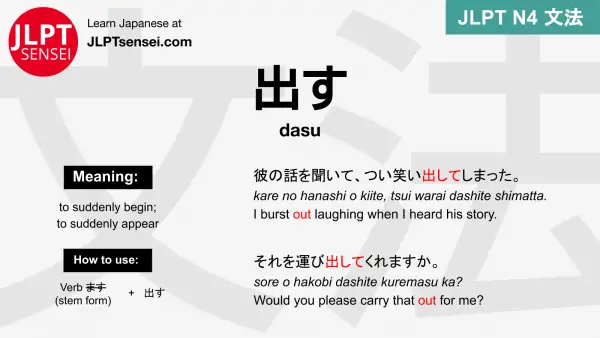Learn Japanese grammar: 出す 【だす】(dasu). Meaning: to begin to; to start to; to burst into; … out (e.g. to jump out, to carry out).
This is used after a verb’s stem form to emphasis “outward” action. For example, the action being carried out, or being started, etc.

Click the image to download the flashcard.
Download all N4 grammar flashcards.

Download our complete
JLPT N4 Grammar Master E-book.
Access ALL extra downloads, ebooks, and study guides by supporting JLPT Sensei on Patreon.
出す - Example Sentences 例文
Each example sentence includes a Japanese hint, the romaji reading, and the English translation.
Click the below red button to toggle off and and on all of the hints, and you can click on the buttons individually to show only the ones you want to see.
Example #1
雨が急に降り出した。
Example #2
彼は店から飛び出した。
Example #3
校長室へ呼び出された。
Example #4
それを運び出してくれますか。
Example #5
朝食後すぐに飛び出した。
Example #6
彼の話を聞いて、つい笑い出してしまった。
Example #7
彼を呼び出しても良いですか?
Example #8
そのファンはアイドルに会えた喜びのあまり、泣き出した。
Example #9
彼はちょっと前までは笑っていたが、すぐに泣き出してしまった。
Vocabulary List 語彙
| Kanji 漢字 | Kana カナ | English 英語 |
|---|---|---|
| 雨 | あめ | rain |
| 出す | だす | to take out; to get out; to put out; to reveal |
| 会う | あう | to meet; to encounter; to see |
| 前 | まえ | previous; before; in front; ago |
View all JLPT N4 Vocabulary Lessons

View all JLPT N4 Grammar Lessons
JLPT N4 Study Guide
JLPT N4 Grammar Master [e-book]
Complete Study Guide
This e-book includes every grammar point you need to know in order to pass the JLPT N4, with detailed usage notes and numerous example sentences.
Pages: 293.
Grammar lessons: 131.





